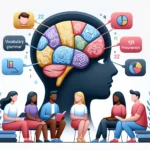Language Skills and Their Influence on IQ Scores: Unveiling the Connection
Understanding the relationship between language skills and IQ scores is paramount for educators, psychologists, and individuals alike. When it comes to assessing intelligence, IQ tests are a standard measure, yet they often encompass a variety of verbal components that can influence outcomes. Through this exploration, we’ll delve into how language proficiency may impact IQ testing and the implications it has on both educational settings and personal development.
Language Proficiency: A Catalyst for Enhanced Cognitive Performance
The mastery of language is not merely about communication; it also reflects and shapes our cognitive abilities. Research has shown that robust language skills can enhance cognitive processing, critical thinking, and problem-solving abilities—all key components of what is traditionally measured by IQ tests. As such, individuals with strong linguistic abilities often perform better on IQ assessments, particularly on verbal sections that require comprehension, vocabulary knowledge, and the ability to articulate complex ideas.
The Impact of Language Skills on Standard IQ Assessments
Standard IQ assessments frequently comprise verbal reasoning, vocabulary, reading comprehension, and other language-based sections. This means that individuals with higher language proficiency are at an advantage, as they can more easily navigate the challenges presented by these tests. Consequently, a direct correlation is often observed between language skills and higher IQ scores, suggesting that linguistic competence is indeed integral to what is being measured in these standard tests.
Cultural and Environmental Factors Shaping Language and Intelligence
It’s important to consider the role of environmental and cultural factors when discussing language skills and IQ scores. Language development is profoundly influenced by one’s surroundings, educational opportunities, and socio-economic status. Therefore, individuals exposed to enriched linguistic environments from a young age—such as access to books, diverse vocabulary, and engagement in conversations—are more likely to develop superior language skills, which may boost their IQ performance. This raises vital questions about the equity of IQ tests, as they may inadvertently reflect an individual’s background and resources rather than pure cognitive capability.
Bilingualism and Its Complex Relationship with IQ
The intersection between bilingualism and IQ is a subject of ongoing study. Bilingual individuals engage with language in unique ways, often demonstrating impressive executive control and cognitive flexibility. These skills can contribute to higher scores in certain aspects of IQ tests, especially in problem-solving and pattern recognition tasks. However, if an IQ test is heavily language-dependent and not presented in the individuals’ strongest language, it might not accurately reflect their true intellect, highlighting the limitations of IQ tests in assessing the intelligence of multilingual persons.
Implications for Education Systems and Cognitive Assessments
The insights gained from linking language skills to IQ highlight the necessity for education systems to provide robust language education from early childhood onwards. Educators must ensure that students develop strong language foundations to support their cognitive growth and preparedness for various intelligence assessments. It also underscores the importance of refining cognitive assessment tools so they more fairly evaluate a person’s intelligence irrespective of linguistic background or proficiency.
In Conclusion: Language, Intelligence, and Equitable Measurement
The intricate dance between language skills and IQ scores is one that cannot be ignored. While strong language skills positively correlate with high IQ scores, it is crucial to remember that intelligence is multifaceted and extends beyond verbal abilities. A comprehensive evaluation of intelligence should consider diverse aspects of cognitive functioning while mitigating the potential for linguistic bias. As our understanding of intelligence deepens, so too should our commitment to fostering inclusive and equitable assessments that allow every individual’s cognitive potential to be recognized and nurtured.

